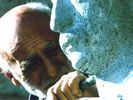Eye For Film >> Movies >> Return Of The Poet (2006) Film Review
As I sat in the cinema, watching this film on the big screen, I swear I could smell and taste the scenes I was seeing. I caught myself with these feelings several times and that's a measure of the film's sensual quality - it's classic art and social documentary.
Return Of Yhe Poet starts in a cemetery. On an old but well-tended gravestone is the image of a man, dashing but with a soft face. This image is what Harutyun Kachatryan's camera is interested in. The words on the grave are written in the Cyrillic alphabet, for this is Armenia, where Islam and Christianity meet, and this grave is the final resting place of Ashugh Jivani, the nation's poet.

Men's and children's choirs sing Jivani's lyrical poems, poems that are clearly ingrained in their psyche. There is almost no scripted dialogue - the pictures speak that universal language of film.
The scene switches to a quiet room, with tools and materials - a studio. Clay is worked skilfully, folded in on itself, kneaded, like bread. The sculptor, his face whiskered and crevassed, is not named, I guess to keep the focus on Jivani. The sculptor and his assistant work quietly, chopping, shaping, shaving the clay. The detailed maquette is completed. It is the figure of the man in the picture on the grave. A cover is laid over the figure and when it is removed, the statue has a fine finish to it - damp clay with a sheen.
Then there are huge explosions in a quarry. Everything is on a giant scale. The dust dies down and tiny people and trucks skitter across the off-planet landscape. A man scrambles across a colossal field of colossal boulders. It is our sculptor, selecting his raw materials. The process of creating the sculpture is intense and absorbing. A process of weeks is reduced to minutes and the face of Jivani, eyes half shut in contemplation, forms in the midst of dust and noise. The finished statue is hoisted onto a trailer hitched to the back of a lorry with ramshackle cranes and equipment. It seems at some points that it will fall, simply because of the impatience of the engineers, but eventually it is secured.
The journey begins and as the film and statue roll, we see Armenia, a land freed from Soviet rule and not under the eye of Washington. It's clear the people are leaning back to their older ways. Orthodox Christianity is renewing its grasp on the people of the area as churches are restored and stonemasons find themselves in high demand. This is the Old World, timeless and apparently unchanging.
This film reveals so much to us - the lack of secular influences, the dominance of the church, the passion of the faithful, the strength of their young people. The skill of the sculptor is laid bare but it is the statue's journey across the Armenian landscape that is of greatest significance. Here in the West we have it easy; there, in the East, life is tough and evolution operates by happenstance and attrition and you can see all that by going to see this film.
Reviewed on: 07 Sep 2006
















